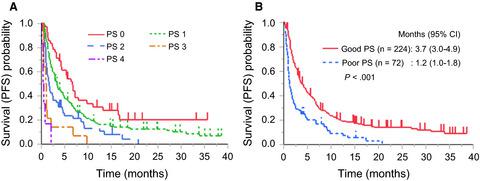当前位置:
X-MOL 学术
›
Cancer Med.
›
论文详情
Our official English website, www.x-mol.net, welcomes your
feedback! (Note: you will need to create a separate account there.)
Predictive factors for progression-free survival in non-small cell lung cancer patients receiving nivolumab based on performance status.
Cancer Medicine ( IF 2.9 ) Pub Date : 2019-12-27 , DOI: 10.1002/cam4.2807 Yuichi Adachi 1 , Akihiro Tamiya 1 , Yoshihiko Taniguchi 1 , Takatoshi Enomoto 1 , Kouji Azuma 1 , Shunichi Kouno 1 , Yuji Inagaki 1 , Nobuhiko Saijo 1 , Kyoichi Okishio 2 , Shinji Atagi 2
Cancer Medicine ( IF 2.9 ) Pub Date : 2019-12-27 , DOI: 10.1002/cam4.2807 Yuichi Adachi 1 , Akihiro Tamiya 1 , Yoshihiko Taniguchi 1 , Takatoshi Enomoto 1 , Kouji Azuma 1 , Shunichi Kouno 1 , Yuji Inagaki 1 , Nobuhiko Saijo 1 , Kyoichi Okishio 2 , Shinji Atagi 2
Affiliation

|
BACKGROUND
Nivolumab has promising efficacy for the treatment of non-small cell lung cancer (NSCLC). Various predictive factors for nivolumab response in those with NSCLC have been reported, including performance status (PS). The objective of this retrospective study was to determine the predictive factors for nivolumab response in those with NSCLC with good PS and those with poor PS.
METHODS
We retrospectively collected pretreatment clinical data of 296 consecutive patients with NSCLC treated with nivolumab. We investigated the relationship between progression-free survival (PFS) and patient characteristics and analyzed predictive factors associated with good PS (PS 0-1) or poor PS (PS 2-4).
RESULTS
The median age of patients was 70 years; 206 patients were male, and 224 were classified as having good PS (PS 0-1). The median PFS was 3.0 months, 3.7 months, and 1.2 months for all patients, patients with good PS, and patients with poor PS respectively. Multivariate analysis showed that never smoking (hazard ratio [HR], 1.77; 95% confidence interval [CI], 1.15-2.75), high C-reactive protein (CRP) (HR, 1.39; 95% CI, 1.00-1.93), liver metastasis (HR, 1.95; 95% CI, 1.24-3.07), pleural effusion (HR, 1.45; 95% CI, 1.06-2.00), and steroid use (HR, 2.85; 95% CI, 1.65-4.94) were associated with significantly shorter PFS in patients with good PS. A high advanced lung cancer inflammation index (ALI) was significantly associated with longer PFS in patients with poor PS (HR, 0.24; 95% CI, 0.08-0.79).
CONCLUSIONS
In patients with NSCLC treated with nivolumab, the factors found to be predictive of shorter PFS in patients with good PS were never smoking, high CRP, liver metastasis, pleural effusion, and steroid administration, whereas high ALI was predictive of longer PFS in patients with poor PS.
中文翻译:

根据表现状况,接受nivolumab的非小细胞肺癌患者无进展生存的预测因素。
背景技术Nivolumab具有治疗非小细胞肺癌(NSCLC)的有前途的功效。已经报道了NSCLC患者中nivolumab反应的各种预测因素,包括表现状态(PS)。这项回顾性研究的目的是确定PS良好和PS不良的NSCLC患者的nivolumab反应的预测因素。方法我们回顾性收集了296例连续使用nivolumab治疗的NSCLC患者的治疗前临床数据。我们调查了无进展生存期(PFS)与患者特征之间的关系,并分析了与PS良好(PS 0-1)或PS不良(PS 2-4)相关的预测因素。结果患者的中位年龄为70岁。206例患者为男性,其中224例患者具有良好的PS(PS 0-1)。PFS中位数为3.0个月,所有患者,PS良好的患者和PS不良的患者分别为3.7个月和1.2个月。多因素分析显示,从不吸烟(危险比[HR]为1.77; 95%置信区间[CI]为1.15-2.75),高C反应蛋白(CRP)(HR为1.39; 95%CI为1.00-1.93),肝转移(HR,1.95; 95%CI,1.24-3.07),胸腔积液(HR,1.45; 95%CI,1.06-2.00)和类固醇使用(HR,2.85; 95%CI,1.65-4.94)相关PS良好的患者中PFS明显缩短。PS不良的患者,较高的晚期肺癌炎症指数(ALI)与较长的PFS显着相关(HR,0.24; 95%CI,0.08-0.79)。结论在用纳武单抗治疗的非小细胞肺癌患者中,发现可以预示良好PS患者PFS较短的因素包括:从不吸烟,高CRP,肝转移,胸腔积液,
更新日期:2019-12-27
中文翻译:

根据表现状况,接受nivolumab的非小细胞肺癌患者无进展生存的预测因素。
背景技术Nivolumab具有治疗非小细胞肺癌(NSCLC)的有前途的功效。已经报道了NSCLC患者中nivolumab反应的各种预测因素,包括表现状态(PS)。这项回顾性研究的目的是确定PS良好和PS不良的NSCLC患者的nivolumab反应的预测因素。方法我们回顾性收集了296例连续使用nivolumab治疗的NSCLC患者的治疗前临床数据。我们调查了无进展生存期(PFS)与患者特征之间的关系,并分析了与PS良好(PS 0-1)或PS不良(PS 2-4)相关的预测因素。结果患者的中位年龄为70岁。206例患者为男性,其中224例患者具有良好的PS(PS 0-1)。PFS中位数为3.0个月,所有患者,PS良好的患者和PS不良的患者分别为3.7个月和1.2个月。多因素分析显示,从不吸烟(危险比[HR]为1.77; 95%置信区间[CI]为1.15-2.75),高C反应蛋白(CRP)(HR为1.39; 95%CI为1.00-1.93),肝转移(HR,1.95; 95%CI,1.24-3.07),胸腔积液(HR,1.45; 95%CI,1.06-2.00)和类固醇使用(HR,2.85; 95%CI,1.65-4.94)相关PS良好的患者中PFS明显缩短。PS不良的患者,较高的晚期肺癌炎症指数(ALI)与较长的PFS显着相关(HR,0.24; 95%CI,0.08-0.79)。结论在用纳武单抗治疗的非小细胞肺癌患者中,发现可以预示良好PS患者PFS较短的因素包括:从不吸烟,高CRP,肝转移,胸腔积液,











































 京公网安备 11010802027423号
京公网安备 11010802027423号